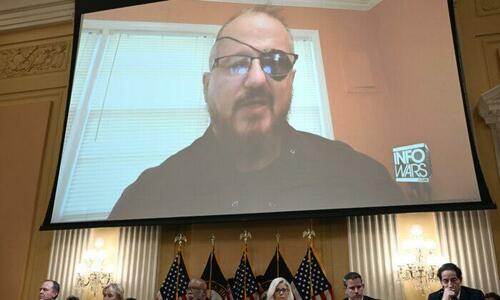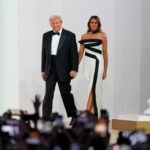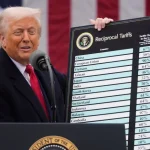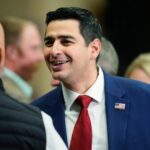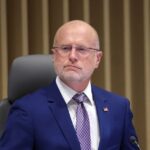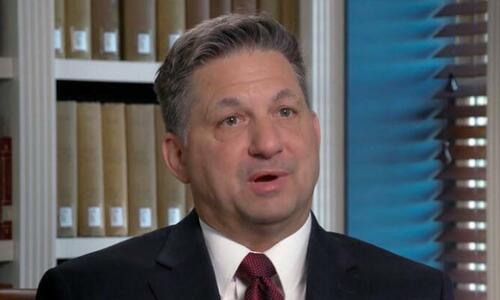
Authored by Joseph Hanneman via The Epoch Times,
The Oath Keepers did not try to overthrow the U.S. government on Jan. 6 and are not a threat to national security because the group is anti-tyranny, not anti-government, a former FBI agent and Department of Defense analyst testified Dec. 15-16 in Alaska Superior Court.
John Guandolo, who handled counter-terrorism and criminal investigations during nearly 13 years as an FBI special agent, said he found “absurd” the idea that Oath Keepers tried to overthrow the federal government. Guandolo was at the Capitol on Jan. 6, 2021, in a personal capacity.
Some of the Oath Keepers might have broken federal laws on Jan. 6 for allegedly trying to delay the counting of Electoral College votes, Guandolo said, “but to conflate that to being the same as the entire organization wants to overthrow the U.S. government by violence … that’s absurd,” Guandolo said. “And I think it’s an unprofessional assessment.”
Guandolo’s testimony came on the third and fourth days of a state trial to determine if Rep. David Eastman (R-Wasilla) should be removed from office under the Alaska Constitution because he is a life member of the Oath Keepers. Eastman won reelection on Nov. 8 by a 24-point margin.
Alaska Superior Court Judge Jack McKenna issued a temporary restraining order preventing the state of Alaska from certifying the House 27th District election results until the trial ends.
Former GOP candidate Randall Kowalke—who left the Republican Party in 2019—sued Eastman personally in July, claiming a loyalty clause in the Alaska Constitution should bar him from office because the Oath Keepers allegedly advocate for the overthrow of the federal government.
Alaska State Rep. David Eastman (R-Wasilla) was sued in July 2022 in an effort to force him from office for being a member of Oath Keepers. (Photo courtesy of David Eastman)
Earlier in the bench trial before McKenna, two analysts from centers on domestic extremism testified that the Oath Keepers went into the Capitol on Jan. 6 and tried to overthrow the government.
‘A Far Cry’ from Insurrection
Testifying from his office in Dallas, Guandolo told the judge there is no evidence to support that accusation. He ripped the testimony of analysts Jonathan Lewis and Matthew Kriner as “grossly incomplete” and “wholly unprofessional.”
Oath Keepers founder Elmer Stewart Rhodes III and Oath Keepers Florida leader Kelly Meggs were found guilty of seditious conspiracy on Nov. 29 for actions on Jan. 6, in a jury trial in U.S. District Court in Washington. Four other defendants were acquitted of seditious conspiracy, but convicted of other offenses.
“The phrase that I saw most often [in indictments] was that so-and-so intended to affect the government by stopping or delaying the congressional proceeding, which was to certify the election,” Guandolo said when questioned by defense attorney Joseph Miller.
“That is a far cry from overthrowing the U.S. government by force of violence.”
Guandolo said the plaintiff’s experts appeared to have pre-existing ideas about the Oath Keepers, because they failed to examine the good work the group does, such as hurricane relief and guarding a bakery against mob violence during protests in Ferguson, Missouri, in the summer of 2014.
He noted their alleged lack of knowledge of Jan. 6 provocateur Ray Epps, and their failure to interview even one member of the Oath Keepers as evidence.
In earlier testimony, Lewis, a research fellow at the Program on Extremism at George Washington University, claimed that Epps did not incite people to go into the Capitol on Jan. 6. He said that was a “discredited conspiracy theory.”
Viral videos showed Epps in downtown Washington on the evening of Jan. 5 saying: “Tomorrow—I don’t even like to say it because I’ll be arrested—we need to go into the Capitol.”
Guandolo said the plaintiff’s focus “was on only specific negative acts and opining on those specific negative acts, without any mention, and, again, based on their own testimony, no apparent knowledge of the positives and the mission statement across the country at the numerous operations the Oath Keepers have undertaken since their founding.”
After meeting and speaking with “hundreds” of Oath Keepers over the years, Guandolo said, he concluded the group has no bias against the government.
“They are not anti-government or anti-authority,” Guandolo said.
“They’re anti-tyranny and anti-anything that infringes on the natural rights and constitutional rights of American citizens.”
Guandolo expressed concern with the use of terms such as “domestic violent extremism,” used by academic experts and even in a recent FBI bulletin on domestic threats in America.
“There is no legal definition for violent extremism, which is exactly our adversaries’ intent,” Guandolo said. “And as a matter of fact, I heard yesterday the phrase ‘violent extremism’ defined by plaintiffs’ witness as somebody who’s willing to do violence in furtherance of achieving their goal.
Stewart Rhodes, founder of the Oath Keepers, appears on a screen during a House Select Committee hearing to Investigate the Jan. 6 Attack on the U.S. Capitol, in the Cannon House Office Building on Capitol Hill in Washington on June 9, 2022. (Brendan Smialowski/AFP via Getty Images)
“And what’s problematic about that from a legal standpoint,” he said, “is that describes members of the U.S. military, that describes police officers, that describes U.S. citizens who are exercising their natural right to defend themselves, as well as their constitutional right to do so and their lawful right to do so.”
Use of the term domestic violent extremism is “an information operation,” Guandolo said, because “it doesn’t legally actually define anything. And the way the plaintiff’s witnesses defined it, it basically can be used against anybody that uses violence. And violence is neither good nor bad.”
‘I Couldn’t Tell You That’
Kriner, a senior research scholar at the Center on Terrorism, Extremism and Counterterrorism at the Middlebury Institute of International Studies, was asked by Miller on Dec. 15, “Why do we even have an oath to the Constitution?”
Kriner replied: “I couldn’t tell you that.”
Guandolo said he was troubled by that answer. “Again, I and I’m not trying to make any other kind of statement other than it tells me it’s either a grossly biased perspective that the witness is coming from, or they just don’t know,” Guandolo said. “And in either case, I think is really unprofessional.”
The oath to defend the Constitution against “all enemies, foreign and domestic,” is a crucial part of America, Guandolo said.
“… When police officers and military people and elected officials and judges take these oaths, it literally is the foundation for our entire system,” he said, “because our fidelity is to the Constitution.”
Guandolo said Oath Keepers Vice President Greg McWhirter, who also served as an FBI informant during the Jan. 6 investigation, would have been “duty-bound, if there was a known, organized effort to overthrow the U.S. government,” to report it.
McWhirter’s role as an FBI informant came out during the Rhodes trial. A former sheriff’s deputy in Marion County, Ind., McWhirter suffered a cardiac event just before his scheduled trip from Montana to Washington to testify in the trial.
“Mr. McWhirter, you know, obviously had access to Mr. Rhodes, knew … what Oath Keepers was doing and what they were up to,” Guandolo said, “and of course he would have been duty-bound to report something such as an organized effort to violently overthrow the government.”
Authored by Joseph Hanneman via The Epoch Times,
The Oath Keepers did not try to overthrow the U.S. government on Jan. 6 and are not a threat to national security because the group is anti-tyranny, not anti-government, a former FBI agent and Department of Defense analyst testified Dec. 15-16 in Alaska Superior Court.
John Guandolo, who handled counter-terrorism and criminal investigations during nearly 13 years as an FBI special agent, said he found “absurd” the idea that Oath Keepers tried to overthrow the federal government. Guandolo was at the Capitol on Jan. 6, 2021, in a personal capacity.
Some of the Oath Keepers might have broken federal laws on Jan. 6 for allegedly trying to delay the counting of Electoral College votes, Guandolo said, “but to conflate that to being the same as the entire organization wants to overthrow the U.S. government by violence … that’s absurd,” Guandolo said. “And I think it’s an unprofessional assessment.”
Guandolo’s testimony came on the third and fourth days of a state trial to determine if Rep. David Eastman (R-Wasilla) should be removed from office under the Alaska Constitution because he is a life member of the Oath Keepers. Eastman won reelection on Nov. 8 by a 24-point margin.
Alaska Superior Court Judge Jack McKenna issued a temporary restraining order preventing the state of Alaska from certifying the House 27th District election results until the trial ends.
Former GOP candidate Randall Kowalke—who left the Republican Party in 2019—sued Eastman personally in July, claiming a loyalty clause in the Alaska Constitution should bar him from office because the Oath Keepers allegedly advocate for the overthrow of the federal government.
Alaska State Rep. David Eastman (R-Wasilla) was sued in July 2022 in an effort to force him from office for being a member of Oath Keepers. (Photo courtesy of David Eastman)
Earlier in the bench trial before McKenna, two analysts from centers on domestic extremism testified that the Oath Keepers went into the Capitol on Jan. 6 and tried to overthrow the government.
‘A Far Cry’ from Insurrection
Testifying from his office in Dallas, Guandolo told the judge there is no evidence to support that accusation. He ripped the testimony of analysts Jonathan Lewis and Matthew Kriner as “grossly incomplete” and “wholly unprofessional.”
Oath Keepers founder Elmer Stewart Rhodes III and Oath Keepers Florida leader Kelly Meggs were found guilty of seditious conspiracy on Nov. 29 for actions on Jan. 6, in a jury trial in U.S. District Court in Washington. Four other defendants were acquitted of seditious conspiracy, but convicted of other offenses.
“The phrase that I saw most often [in indictments] was that so-and-so intended to affect the government by stopping or delaying the congressional proceeding, which was to certify the election,” Guandolo said when questioned by defense attorney Joseph Miller.
“That is a far cry from overthrowing the U.S. government by force of violence.”
Guandolo said the plaintiff’s experts appeared to have pre-existing ideas about the Oath Keepers, because they failed to examine the good work the group does, such as hurricane relief and guarding a bakery against mob violence during protests in Ferguson, Missouri, in the summer of 2014.
He noted their alleged lack of knowledge of Jan. 6 provocateur Ray Epps, and their failure to interview even one member of the Oath Keepers as evidence.
In earlier testimony, Lewis, a research fellow at the Program on Extremism at George Washington University, claimed that Epps did not incite people to go into the Capitol on Jan. 6. He said that was a “discredited conspiracy theory.”
Viral videos showed Epps in downtown Washington on the evening of Jan. 5 saying: “Tomorrow—I don’t even like to say it because I’ll be arrested—we need to go into the Capitol.”
Guandolo said the plaintiff’s focus “was on only specific negative acts and opining on those specific negative acts, without any mention, and, again, based on their own testimony, no apparent knowledge of the positives and the mission statement across the country at the numerous operations the Oath Keepers have undertaken since their founding.”
After meeting and speaking with “hundreds” of Oath Keepers over the years, Guandolo said, he concluded the group has no bias against the government.
“They are not anti-government or anti-authority,” Guandolo said.
“They’re anti-tyranny and anti-anything that infringes on the natural rights and constitutional rights of American citizens.”
Guandolo expressed concern with the use of terms such as “domestic violent extremism,” used by academic experts and even in a recent FBI bulletin on domestic threats in America.
“There is no legal definition for violent extremism, which is exactly our adversaries’ intent,” Guandolo said. “And as a matter of fact, I heard yesterday the phrase ‘violent extremism’ defined by plaintiffs’ witness as somebody who’s willing to do violence in furtherance of achieving their goal.
Stewart Rhodes, founder of the Oath Keepers, appears on a screen during a House Select Committee hearing to Investigate the Jan. 6 Attack on the U.S. Capitol, in the Cannon House Office Building on Capitol Hill in Washington on June 9, 2022. (Brendan Smialowski/AFP via Getty Images)
“And what’s problematic about that from a legal standpoint,” he said, “is that describes members of the U.S. military, that describes police officers, that describes U.S. citizens who are exercising their natural right to defend themselves, as well as their constitutional right to do so and their lawful right to do so.”
Use of the term domestic violent extremism is “an information operation,” Guandolo said, because “it doesn’t legally actually define anything. And the way the plaintiff’s witnesses defined it, it basically can be used against anybody that uses violence. And violence is neither good nor bad.”
‘I Couldn’t Tell You That’
Kriner, a senior research scholar at the Center on Terrorism, Extremism and Counterterrorism at the Middlebury Institute of International Studies, was asked by Miller on Dec. 15, “Why do we even have an oath to the Constitution?”
Kriner replied: “I couldn’t tell you that.”
Guandolo said he was troubled by that answer. “Again, I and I’m not trying to make any other kind of statement other than it tells me it’s either a grossly biased perspective that the witness is coming from, or they just don’t know,” Guandolo said. “And in either case, I think is really unprofessional.”
The oath to defend the Constitution against “all enemies, foreign and domestic,” is a crucial part of America, Guandolo said.
“… When police officers and military people and elected officials and judges take these oaths, it literally is the foundation for our entire system,” he said, “because our fidelity is to the Constitution.”
Guandolo said Oath Keepers Vice President Greg McWhirter, who also served as an FBI informant during the Jan. 6 investigation, would have been “duty-bound, if there was a known, organized effort to overthrow the U.S. government,” to report it.
McWhirter’s role as an FBI informant came out during the Rhodes trial. A former sheriff’s deputy in Marion County, Ind., McWhirter suffered a cardiac event just before his scheduled trip from Montana to Washington to testify in the trial.
“Mr. McWhirter, you know, obviously had access to Mr. Rhodes, knew … what Oath Keepers was doing and what they were up to,” Guandolo said, “and of course he would have been duty-bound to report something such as an organized effort to violently overthrow the government.”
Loading…

